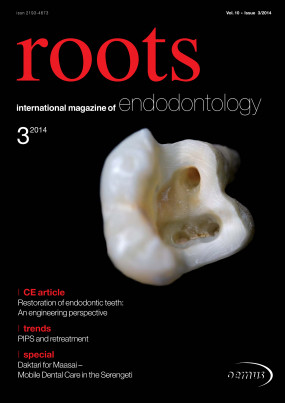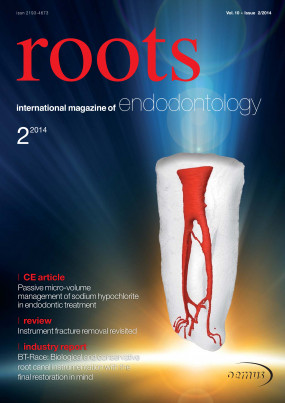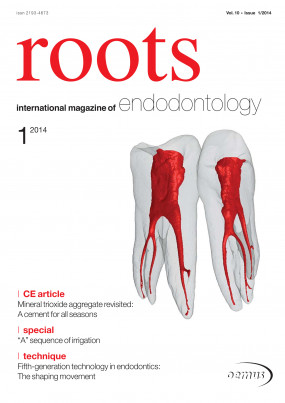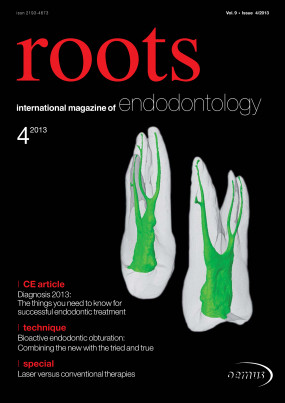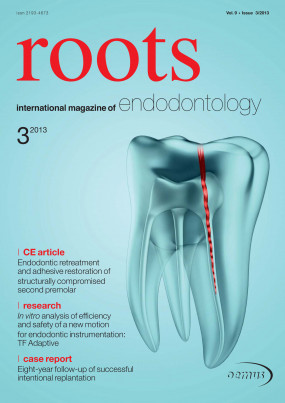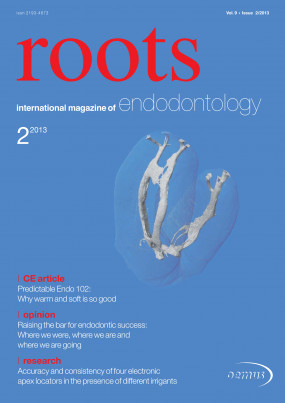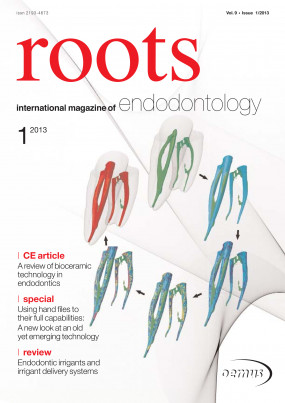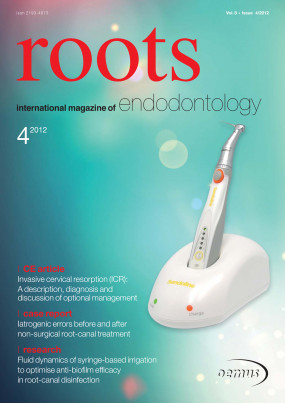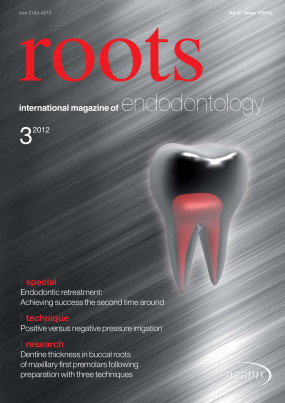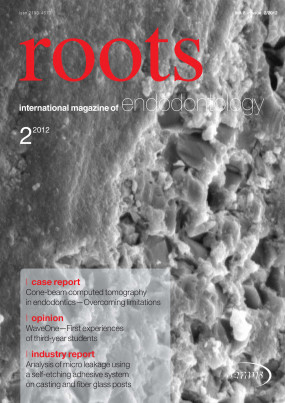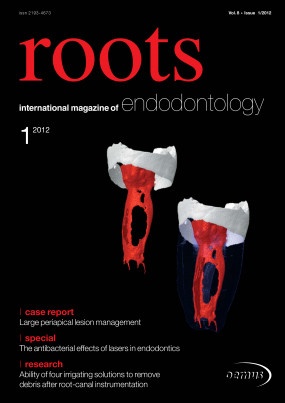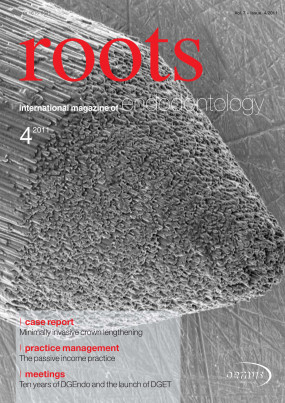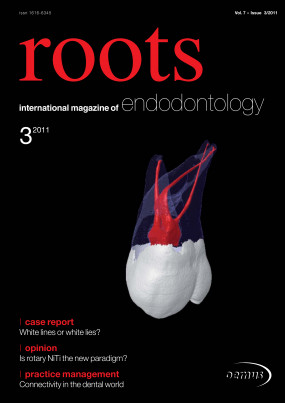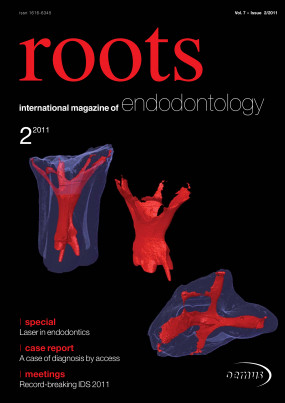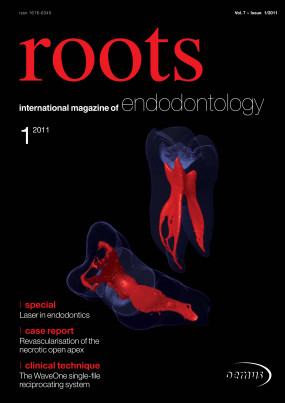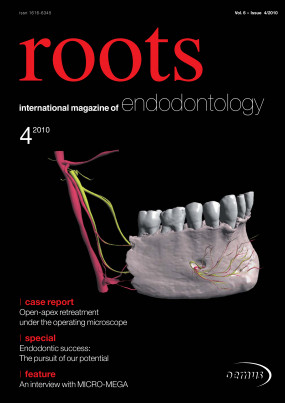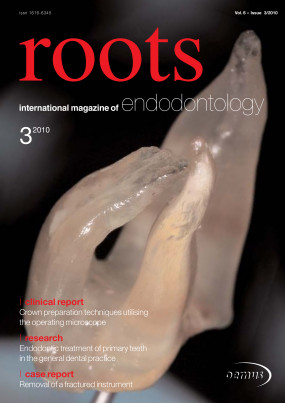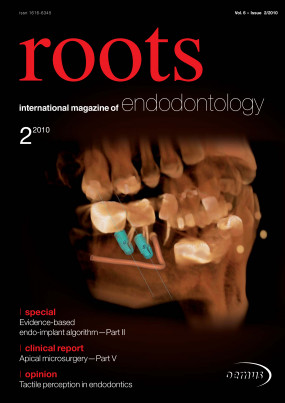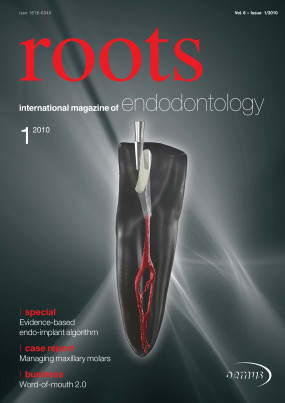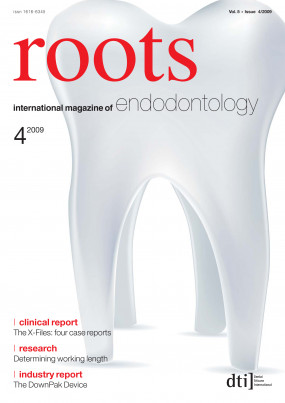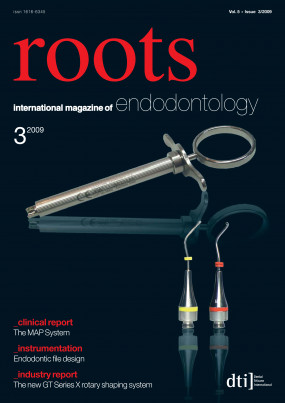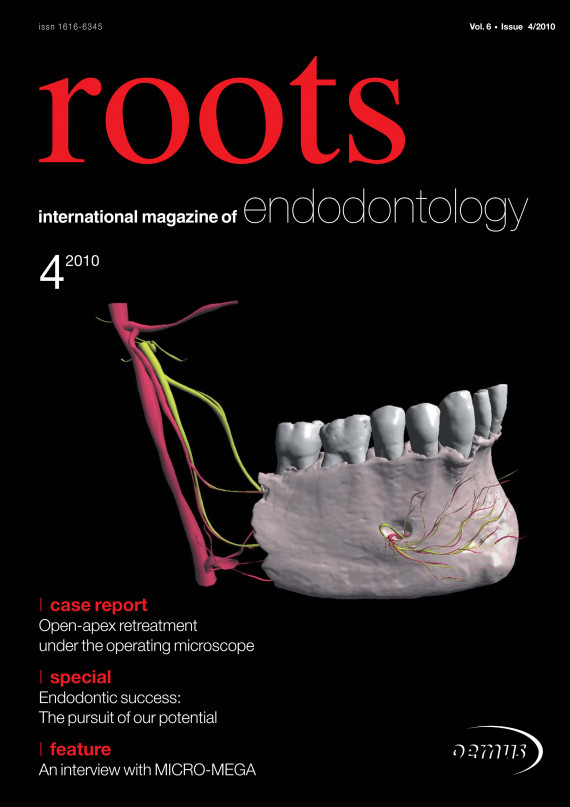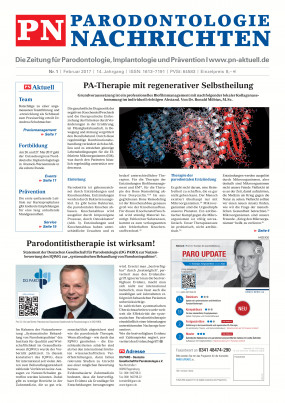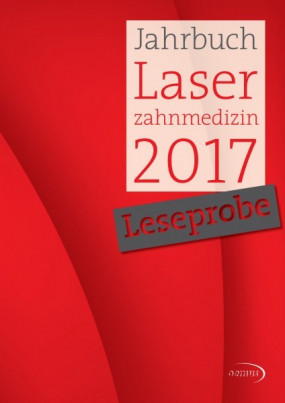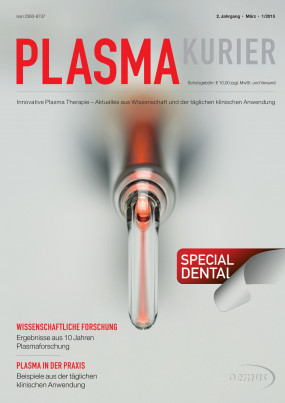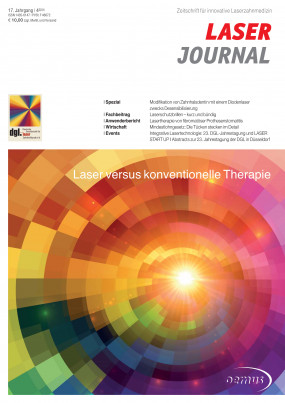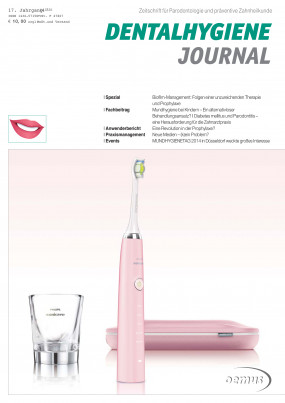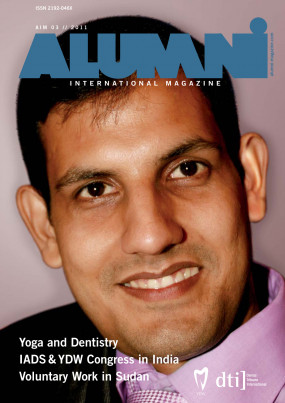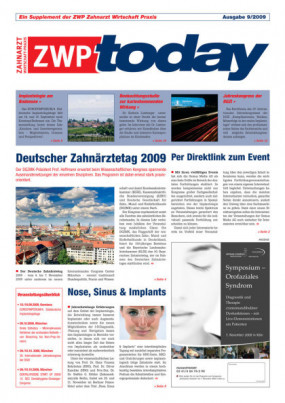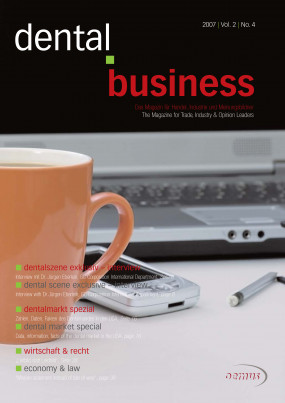Inhaltsverzeichnis
3
Editorial
Prof José F. Siqueira Jr., Professor and Chairperson, Department of Endodontics, Estácio de Sá University, Rio de Janeiro, RJ, Brazil
Endodontics is fascinating. I will put aside the romantic view that endodontics is an art and assume that it is an ever-growing science that requires a great deal of study and training to reach a high-level clinical performance. I dare say that no other clinical discipline in dentistry requires such a vast knowledge of and integration with so many other clinical and basic disciplines.
6
_Owing to the lack of apical constriction, root-canal treatment of permanent teeth with open apices poses great challenges. When it comes to the endo-dontic treatment of such teeth, debridement and obturation of the canal space create a significant problem. The wide-open canal and thin dentinal walls are difficult to clean and shape, and it is even more difficult to obtain an acceptable conventional apical seal. For many years, apexification was the treatment of choice. The main goal of this procedure is to control the bacterial infection and establish a suitable environment for the induction of calcified tissue into the apical area. Calcium hydroxide—Ca(OH)2—has remained the most acceptable intra-canal medicament used for apexification...
10
Endodontics has evolved enormously over the last few decades. However, the basic principles from the past still apply today. The following case report gives an example of the manner in which the old principles are applied with newer techniques, devices and materials.
14
Dr Philippe Sleiman is an endodontist and instructor at the Lebanese University Dental School. He lec-tures and conducts hands-on endodontics courses worldwide and has contributed to sev-eral endodontic publications. His line of endodontic instruments is distributed by Hu-Friedy. Dr Sleiman can be contacted at phil@cyberia.net.lb.
18
Interview: “We are constantly trying to maintain our technological lead”
An interview with Audrey Stefani, Dr Stephan Gruner & Dr Khaled A. Balto
It all started with a nerve broach in 1907. MICRO-MEGA, whose headquarters are located in Besançon (France), has been manufacturing endo-dontic tools for over a hundred years and played a decisive role in endodontics through new developments. Internationally, the innovative company has a recognised reputation of being a specialist in dental instruments. At this year’s Adviser Group for Endo-dontics (AGE) meeting, roots met with Audrey Stefani, MICRO-MEGA Marketing Manager; Dr Stephan Gruner, Country Manager MICRO-MEGA Germany; and Dr Khaled A. Balto (Saudi Arabia), Associate Professor and moderator of the AGE meeting.
22
Endodontics is currently experiencing an exciting period in its evolution: a period when progressive clinicians have become empowered to increase their rates of success owing to new technologies that enhance vision, disinfection and the protective seal of the entire root-canal system. Early in my endodontic journey, Dr Herbert Schilder, a pioneering clinician, encouraged me to reach my full potential. We all aspire to reach our individual potential, and it is this collective pursuit of excellence that guides the future success of our specialty...
30
Since the early days of dentistry, dentists have explored the morphology of the internal root anatomy. From the pre-X-ray period to the techno-logy-driven present, the study and exami-nation of the root-canal system has become an obsession for endo-dontists. Several methods such as radiographic1 and histolo-gical examinations,2–3 cross-and longitudinal sectioning,4 and root-clearing techniques, to name a few, were widely used in the past. Today, different computerised tomography studies5 and observations under dental operating microscopes6 are performed to light up the dark confines of the dental pulp...
32
CBCT applications in dental practice: A literature review
Dr Mohammed A. Alshehri, Dr Hadi M. Alamri & Dr Mazen A. Alshalhoob, Saudi Arabia
Two-dimensional imaging modalities have been used in dentistry since the first intra-oral radiograph was taken in 1896. -Significant progress in dental imaging techniques has since been made, including panoramic imaging and tomography, which enable reduced radiation and faster processing times. However, the imaging geometry has not changed with these commonly used intra-oral and panoramic technologies...
40
Canal curvature has always introduced complexity into canal preparation. Dr James B. Roane’s balanced force technique (1985) was a promising concept using stainless-steel hand instruments in small clockwise and counter-clockwise movements. Based on Dr Roane’s idea but using rotary NiTi instruments and a reciprocating motor, Dr Ghassan Yared (Canada) developed the method to ingenious perfection. After an experimentation phase of more than seven years, he sent his first description of the canal preparation technique with only one rotary instrument to roots in March 2007. In the hands of the experienced endodontist, it worked. However, more than three years and a team of engineers, metallurgists and electronic technicians were necessary to turn a great idea into a professional product, consisting of Reciproc instruments, motor, paper points and gutta-percha points. Dr Yared and VDW Germany now introduced the system for the first time at the 8th World Endodontic Congress in Athens...
42
Athens, the home of democracy, philosophy and culture, welcomed evidence-based endodontics from 6 to 9 October for the 8th World Endodontic Congress. What an interesting combination for those lucky enough to have attended the meeting! The organising committee and the Greek team tried their utmost to satisfy the expectations of the demanding audience. Honestly, with the impressive list of international keynote speakers the organisers were able to attract - Profs Syngcuk Kim (USA), Paul Abbott (Australia), Craig Baumgartner (USA), Edgar Schäfer (Germany), Ken Hargreaves (USA) and Shimon Friedman (Canada) - this was relatively easy. To me, it felt as if chapters of classic endodontic textbooks popped up right in front of me...
44
From 16 to 18 September 2010, over 300 de-legates from 30 different countries assembled in Vilnius, Lithuania, for the second congress of the European Society of Microscope Dentistry (ESMD). I have attended several meetings dedicated to microscope dentistry during my career and have to admit that this one was as good as they get...
46
Endodontics provides an important founda-tion for long-term and lasting tooth preservation. In light of an ageing society, this dental discipline is increasingly gaining importance. With evidence-based success rates of up to 85 per cent for treatments performed lege artis, endodontics has long been established in the range of therapies offered by general dentists, while at the same time offering a variety of tasks for specialists. According to Dr Martin Rickert, Chairperson of the Board of the Association of German Dental Manufacturers (VDDI), “The impressive scientific and technological progress in the field of endodontics has improved the odds of long-term tooth retention tremendously and puts this speciality at the centre of a prophylactic-conservationist approach to dentistry.” The latest methods employed in conservation therapy include manual and automatic root-canal preparation, efficient rinsing methods during disinfection, and modern instruments and materials for obturation...
50
About the publisher: Imprint
Copyright Regulations _roots international magazine of endodontology is published by Oemus Media AG and will appear in 2010 with one issue every quarter. The magazine and all articles and illustrations therein are protected by copyright. Any utilisation w
Kein Kurztext vorhanden. Schauen Sie in die PDF.
